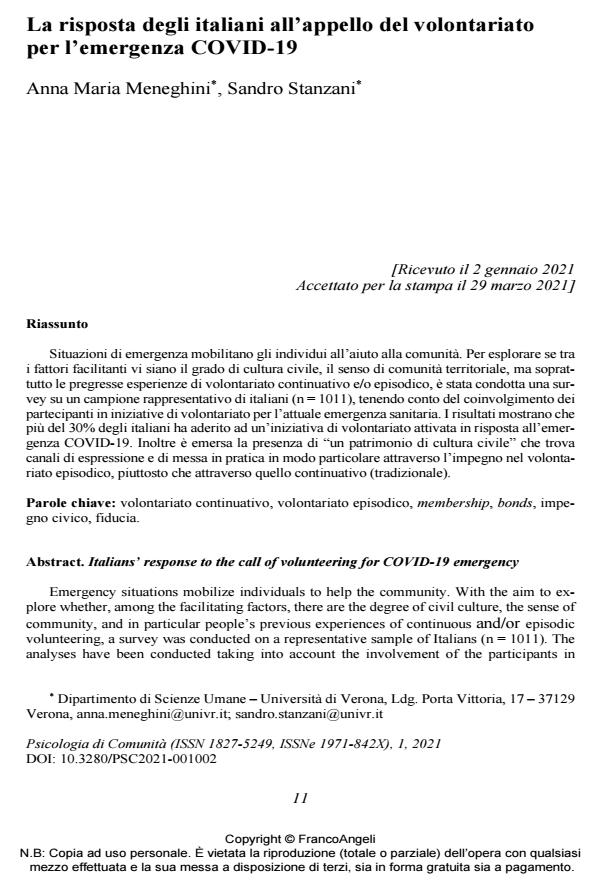La risposta degli italiani all’appello del volontariato per l’emergenza COVID-19
Titolo Rivista PSICOLOGIA DI COMUNITA’
Autori/Curatori Anna Maria Meneghini, Sandro Stanzani
Anno di pubblicazione 2021 Fascicolo 2021/1
Lingua Italiano Numero pagine 18 P. 11-28 Dimensione file 211 KB
DOI 10.3280/PSC2021-001002
Il DOI è il codice a barre della proprietà intellettuale: per saperne di più
clicca qui
Qui sotto puoi vedere in anteprima la prima pagina di questo articolo.
Se questo articolo ti interessa, lo puoi acquistare (e scaricare in formato pdf) seguendo le facili indicazioni per acquistare il download credit. Acquista Download Credits per scaricare questo Articolo in formato PDF

FrancoAngeli è membro della Publishers International Linking Association, Inc (PILA), associazione indipendente e non profit per facilitare (attraverso i servizi tecnologici implementati da CrossRef.org) l’accesso degli studiosi ai contenuti digitali nelle pubblicazioni professionali e scientifiche.
Situazioni di emergenza mobilitano gli individui all’aiuto alla comunità. Per esplorare se tra i fattori facilitanti vi siano il grado di cultura civile, il senso di comunità territoriale, ma soprat-tutto le pregresse esperienze di volontariato continuativo e/o episodico, è stata condotta una survey su un campione rappresentativo di italiani (n = 1011), tenendo conto del coinvolgimen-to dei partecipanti in iniziative di volontariato per l’attuale emergenza sanitaria. I risultati mo-strano che più del 30% degli italiani ha aderito ad un’iniziativa di volontariato attivata in risposta all’emergenza COVID-19. Inoltre è emersa la presenza di "un patrimonio di cultura civile" che trova canali di espressione e di messa in pratica in modo particolare attraverso l’impegno nel volontariato episodico, piuttosto che attraverso quello continuativo (tradizionale).
Parole chiave:Volontariato continuativo, volontariato episodico, membership, bonds, impe-gno civico, fiducia.
- Beyond resilience? A comparative sociological analysis of the impact of the Covid-19 pandemic on five European health care systems Guido Giarelli, Marilin Mantineo, in Routledge Open Research /2025 pp.34
DOI: 10.12688/routledgeopenres.18478.2
Anna Maria Meneghini, Sandro Stanzani, La risposta degli italiani all’appello del volontariato per l’emergenza COVID-19 in "PSICOLOGIA DI COMUNITA’" 1/2021, pp 11-28, DOI: 10.3280/PSC2021-001002